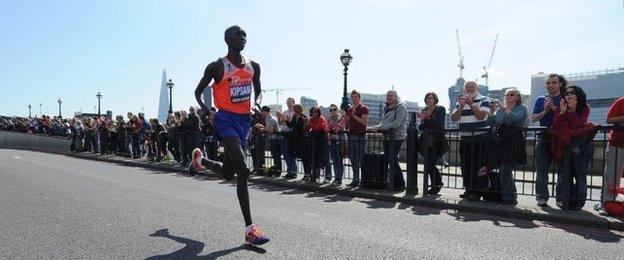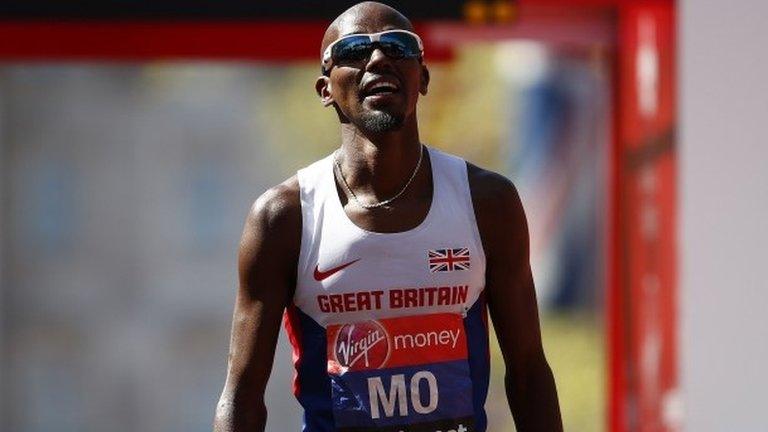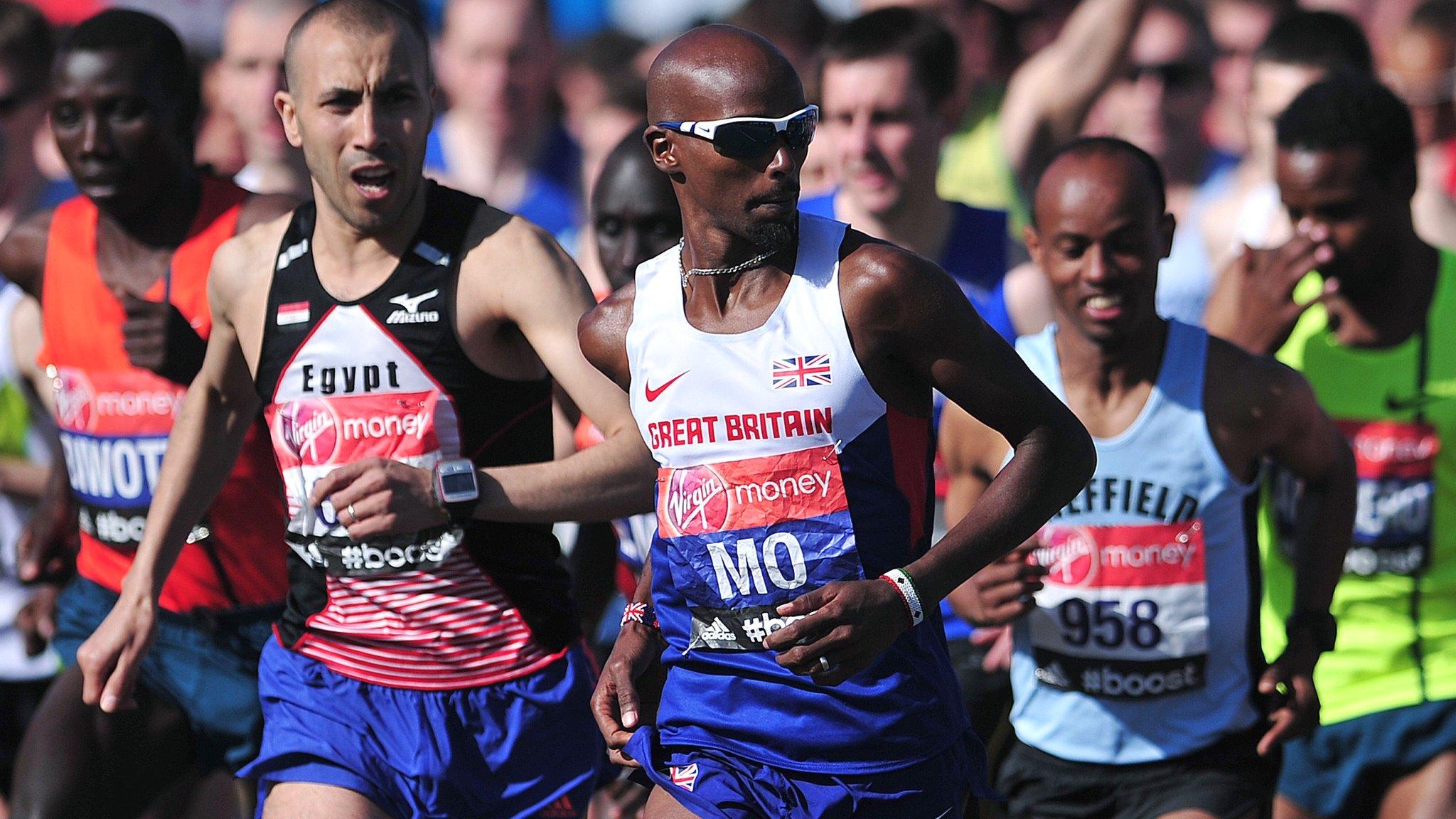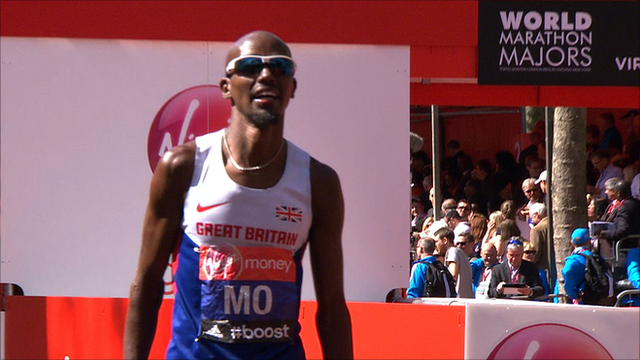London Marathon 2014: Mo Farah powerless to match the hype
- Published
Farah finishes eighth in marathon
So, after four years of coming out on top in every test he has been set, Mo Farah finally struggled for answers.
The surprise is that anyone should be all that surprised. Farah's 2 hours 8 minutes 21 seconds on his London Marathon debut on this sunny Sunday morning may have seen him finish down in eighth place, not just among the elite also-rans but more than a minute off Steve Jones's 29-year-old British record and almost four minutes off winner Wilson Kipsang.
But that is what marathons do: make a mockery of past reputation and the best-laid plans.
Free of the hype that understandably surrounds a debutant of Farah's talent and fame, it is not a disastrous time. What went wrong? Not that much.
Not that much has to. The wise old birds of this toughest event never envisioned Farah entering the charts at number one, no matter what wonders he has achieved on the track at successive World Championships and Olympic Games. No-one is ever an instant marathon success. No-one is ever sure how their body will react until it is subject to such brutal pace over distance.
Farah found himself too far behind the lead group too early. The intention had been to be within 30 seconds at halfway, but so rapid were the elites out front that six miles in he was drifting out to 45 seconds.
As a result he pushed a fraction too hard in the second quarter as he tried to close. As a consequence of that, he had too little left for the final quarter. Such is the cruel nature of the event. Every small misjudgement is magnified, every little bit of inexperience underlined.
He was poorly served at times by his two pacemakers, who ran too far in front of him at times to leave him on his purgatorial own for too long. He also wondered afterwards if he should have hitched a ride with the lead group rather than deliberately be cut adrift so early.
These are all legitimate explanations. At the same time there will be disappointment in the Farah camp, not just for his placing but for the uncharacteristic powerlessness he would have experienced as his considerable expectations unravelled.
These were perfect conditions for distance running - dry but cool, barely enough wind to waft a vest. Farah's preparations at altitude in Kenya had gone as well as his coach Alberto Salazar could have hoped. The support along the capital's streets was as remarkable as you would expect when people have the chance to cheer on the greatest distance runner Britain has ever produced for free.
Humdrum streets were transformed into an elite sporting arena as ever with this occasion - the Lucky Horse Chinese takeaway, Albion pub and Angelo's Fish Bar all glorious grandstands for a day, every gloomy underpass resounding happily to steel bands and massed drummers.
For all that partisan Mo-botting devotion, there will be those who will wonder whether this was the right place for Farah to make his marathon bow.

Wilson Kipsang broke the London Marathon course record by 11 seconds on Sunday
His ascent to the elite is intimately entwined with this race; three times as a teenager he won the mini-marathon, the three-mile race for kids aged from 11-17 that precedes the main event at its Mall finish, and after leaving school in 2001, it was a London Marathon scholarship that paid for him to join the newly established endurance performance centre at St Mary's rather than join the army.
But there was no hiding place, no easy race. In contrast to the only other man in history to pull off his World and Olympic distance double-double, Kenenisa Bekele, who made his own debut on the far quieter streets of Paris a week ago, Farah was a star among many on Sunday, up against arguably the greatest men's field ever assembled.
"This is the city I grew up in," Farah told BBC Sport afterwards, admitting he might have dropped out at 17 miles had it not been for the home support.
"This is my city. It would have been wrong to have done any other marathon. The crowd was amazing. I just wish I could have given them a little bit more."
They are understandable sentiments. Yet Farah was being dictated to by men far more experienced over the distance with far more impressive credentials.
Kipsang is the world record holder, in his 10th marathon. As Farah floundered, he was breaking the London course record by 11 seconds. Kipsang's Kenyan compatriot Stanley Biwott, who lived with him for as long as anyone, was in his ninth elite race over the distance.
Experience counts on days like this. Kipsang timed his own efforts perfectly, dropping in a 4 mins 39 secs mile at the 20-mile mark and then a 4:40 to blow the lead group apart. From the lead pace car, one had a vivid sense of quite how fast that was: had any of the spectators attempted to keep up with him, they would have quit in pieces within 400 metres.
Did Mo make the step-up in distance too soon? Most of the greats who have preceded him have only done so when their track legs were diminished. Bekele is no longer a 5,000m or 10,000m champion. Haile Gebrselassie and Paul Tergat were the same. Tergat, so often the bridesmaid to his great Ethiopian rival, clocked 2:08:15 on his own London debut, which places Farah's efforts in another context.
Certainly he still has enough speed in his legs to be British record holder over a distance as short as the 1500m. He became the sixth fastest man in history over that distance less than a year ago. These are not the numbers of a man shorn of speed.
The Briton will almost certainly drop back down again. While the plan before Sunday may have been to attempt a marathon/10,000m double at the next Olympics in Rio, that will almost certainly now be shelved. As reigning world and Olympic champion over those distances, he is still at his track peak. Why gamble among superiors when you are peerless yourself in two other events?
There will be a fear that some of that previous supremacy may have gone with this defeat.
Traditionally long-distance road work has been held to deaden some of the speed in a track specialist's legs, while the aura of invincibility that has built up around Farah from the Worlds in Daegu onwards may have dissipated a little too.
Physically he will be hurting for a few days. Mentally he will also be wounded.
But he has both the time and ability to recover. There are no major championships for him to target this year, no hurry now to try a marathon again. After Rio there will be opportunities aplenty, and significantly less to risk.
One avenue may have closed for now. Others remain open, and far more rewarding.
Kipsang storms to London Marathon win
- Published13 April 2014

- Published12 April 2014

- Published13 April 2014

- Published10 September 2015

- Published8 February 2019
